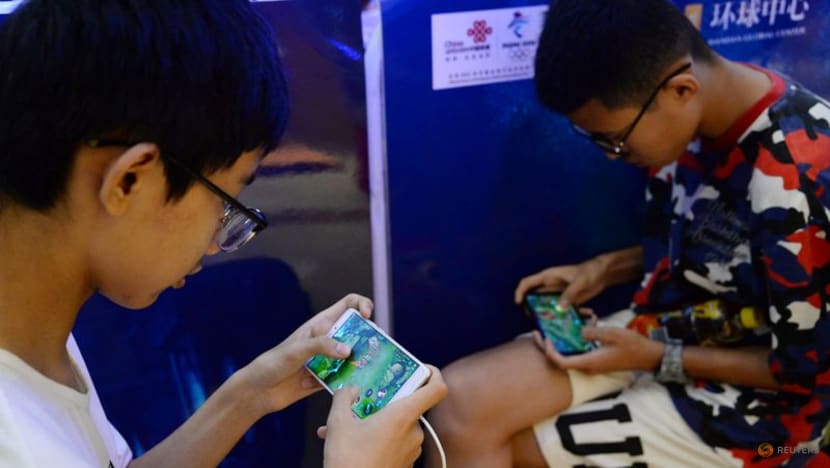China’s new gaming proposals to tackle overspending by children amid online outrage
Following public outcry, China's gaming industry promises to make it easier for parents to get refunds if their kids splurge on in-game extras without permission.


This audio is generated by an AI tool.
SINGAPORE: Parents in China whose children who spend a fortune on gaming without permission may soon have a clearer path for refunds from companies, with an industry body issuing guidelines based on shared responsibility.
Concerns have grown in the world’s largest video gaming market in recent months over children chalking up hefty bills.
On Wednesday (May 29), a video went viral of vegetable sellers in Sichuan whose 12-year-old child spent a staggering 800,000 yuan (US$110,000) in a year to enhance his mobile gaming experience.
In April, another viral video showed a father slapping himself when he discovered his nine-year-old son had spent over 13,000 yuan (US$1,800) on the game Eggy Party. It ignited a debate online on accountability in such cases.
On Tuesday (May 28), the Internet Society of China - a non-profit industry body - released draft guidelines for public consultation aimed at addressing this and other problems.
If formalised, they could lead to companies expediting refunds through dedicated channels.
The guidelines serve as industry standards, which the revised Standardisation Law in China has granted legal status. This means enterprises which voluntarily adopt the measures will be mandated to abide by them. Public consultation lasts for a month until Jun 27.
Under the proposals, online gaming providers will shoulder any overspending on in-game purchases by gamers below the age of 18, if they do not have a system that authenticates users’ real names or enforces spending limits.
They will shoulder 30 to 70 per cent of the responsibility – and cost – if they have restrictions in place but a parent aided the child in circumventing the restrictions or failed to supervise properly. The exact percentage companies will bear hinges on the perceived effectiveness of their restrictions.
Related:
Parents are expected to play their part as gatekeepers.
They may be held fully responsible in cases of repeat guideline violations, such as if minors make multiple refund requests or overspend for a prolonged period of, say, over a year.
SPENDING IS EASY BUT REFUNDS ARE COMPLICATED
The vast majority of parents in China are unaware of their children’s gaming expenditure, which can quickly balloon from buying virtual items such as character skins to change the appearance of one’s in-game character, or power-ups to boost a character’s abilities.
According to a 2023 report by the China Game Publishers Association, only 15.4 per cent of Chinese parents were aware of their children's video game spending.
Among those who sought refunds for their children's in-game purchases, nearly 30 per cent failed due to insufficient evidence provided to the gaming company. Over 38 per cent stated they received a full refund.
Tech giant Sina’s consumer complaints platform Heimao has also received over 26,050 complaints related to "minor in-game top-up" and "guiding minors to top-up”.
“It’s very easy to make in-game purchases - there’s no facial recognition or verification, just a password is needed. But the refund process is complicated, discouraging requests,” a father surnamed Wu, whose 10-year-old son spent over 20,000 yuan on online games in 18 months, told local media in May.
Mr Wu eventually succeeded in getting a full refund when game developer NetEase bowed to public pressure.
Many other parents have griped about the complexity of the refund process, citing gaming companies' intricate procedures, unclear refund policies and stringent evidence requirements to prove unauthorised spending by a child.
Companies, on the other hand, find it “impossible to confirm whether the guardians are aware and take advantage of the refund rules”, according to an industry worker in Hangzhou who spoke anonymously to Chinese media outlet Tide News. Adult users also falsely claim to be underage and seek refunds from time to time.
The new guidelines “provide a standardised path for minors and parents to advocate for their rights and interests, and a template for how enterprises should respond to refund demands”, Mr Yao Zhiwei, a law professor from Guangdong University of Finance and Economics in southern China, told news outlet The Paper.
RULES TO PROTECT CHILD GAMERS TIGHTENED IN RECENT YEARS
In recent years, China has introduced rules to make it harder for minors to spend significant amounts of money on video games.
Companies are prohibited from providing paid services to users under the age of eight. Users aged eight to 16 can only spend up to 200 yuan (US$28) per month, while those aged 16 to 18 are limited to 400 yuan.
The Chinese government has also enacted strict regulations to prevent video game addiction among minors.
In 2021, a law limited minors to three hours of gaming per week, with companies required to enforce this rule through real-name registration systems.
These measures have significantly reduced minors’ spending on video games. In the first quarter of 2023, Chinese gaming giant Tencent reported that minors’ in-game spending and gaming time had dropped by 90 per cent and 96 per cent, respectively, compared to the same period in 2020.
















